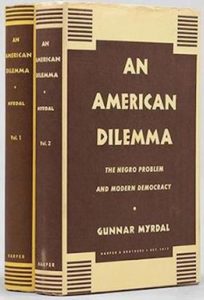
*The book, An American Dilemma: The Negro Problem and Modern Democracy was published on this date in 1944. This book was a study of American race relations authored by white Swedish economist Gunnar Myrdal.
Myrdal's volume, at nearly 1,500 pages, painstakingly detailed what he saw as obstacles to full participation in American society that American blacks faced in the 1940s. Black political scientist, diplomat, and author Ralph Bunche served as Myrdal's primary researcher at the start of the project in the fall of 1938. Also, educator Lemuel Penn assisted as an editor in the early 1940s. The Carnegie Corporation of New York funded the book. The foundation chose Myrdal because it thought that, as a non-American, he could offer a more unbiased opinion.
Myrdal believed he saw a vicious cycle in which whites oppressed Blacks, leading to poor education standards, health, morality, etc., among blacks that justified prejudice and discrimination. He argued that the way out of this cycle was to either reduce white prejudice, which would improve the circumstances of Blacks, or to improve the circumstances of Blacks, which would then reduce the reasons for white prejudice. Myrdal called this process the "principle of accumulation."
Myrdal, writing before the American Civil Rights movement of the 1950s and 1960s, alleged that northern whites were generally ignorant of the situation facing Black citizens and noted that "to get publicity is of the highest strategic importance to the Negro people." The press's pivotal role in the movement proved strikingly prescient. It sold over 100,000 copies and went through 25 printings before entering its second edition in 1965.
It enormously influenced how racial issues were viewed in the United States and was cited in the landmark Brown v. Board of Education case "in general." The book was generally positive in its outlook on the future of race relations in America, taking the view that democracy would triumph over racism. In many ways, it laid the groundwork for future racial integration policies and affirmative action.
To be a Writer
To Become an Editor
To Become a Desktop Publisher